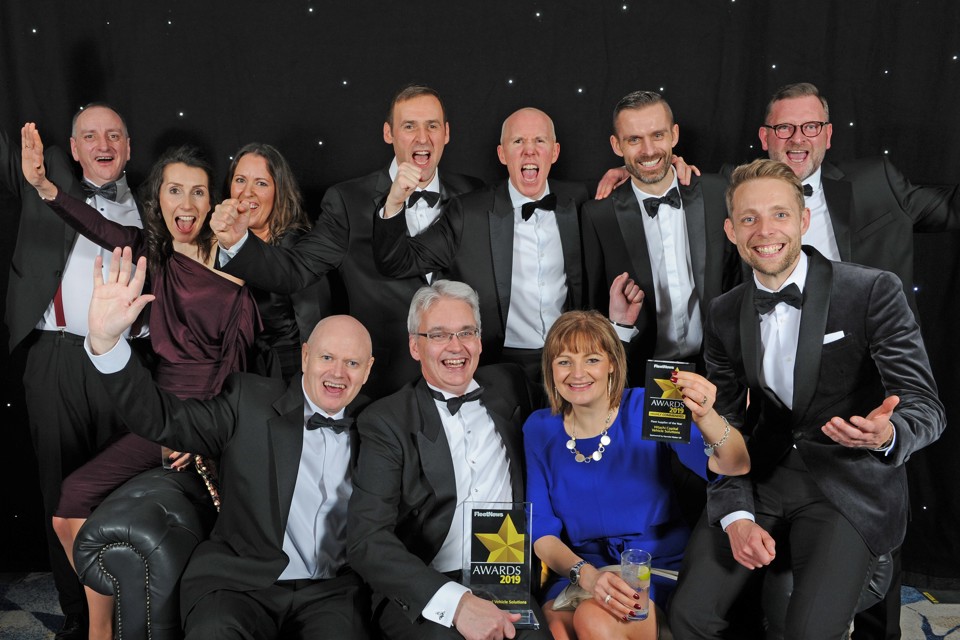Hitachi Capital Vehicle Solutions continues to grow its risk fleet, reaching eighth in last year’s FN50, with some 59,000 cars and vans.
It now operates 63,700 units and a further 4,500 HGVs and specialist vehicles, worth £822 million.
The leasing company, which is a division of the Japanese firm Hitachi Capital, has grown significantly over the past 10 years.
The annual volume of business has risen from £100m in 2009 to £377m in 2018/19. Pre-tax profit also grew year-on-year, up from £24m to £24.8m in the past financial year.
It was crowned Leasing Company of the Year for more than 20,000 vehicles and highly commended as Fleet Supplier of the Year in the 2019 Fleet News Awards. It was also named Leasing Company of the Year at the Commercial Fleet Awards 2018.
“It’s been a good year for us,” says managing director Jon Lawes. “Our Japanese owners think long-term, which is great for us and a real benefit for our customers as well.
“Private equity (owned businesses) are very focused on this year’s results, whereas our owners are looking at where we are going to be in 20 or 30 years’ time.”
It enables the leasing company to show some “pioneering spirit”, according to Lawes, and prepare fleets for a future where electrification and air quality will continue to dominate the agenda.
“We haven’t got all the answers,” he admits, “but if you work together you can have better outcomes.
“Ours is a long-term strategy, where we are trying to build our business and build our brand.”
Its success at this year’s Fleet News Awards was testament to how this strategy is also driven by delivering an excellent customer experience, with the customer at the heart of innovation.
Fleet News: How do you ensure a truly customer-centric approach?
Jon Lawes: We recruited a new head of customer experience and developed a new strategy, but it’s not just been about the strategy, it’s also about the culture.
We have good systems, but customer experience is about people. When you’re talking to a customer, it’s about whether you’re solving their problems, and with drivers it’s about providing a good driver experience.
In addition, a new tool has been implemented called ‘Rant and Rave’, which asks drivers two questions: ‘how was your experience?’ and ‘why?’.
And the we have moved away from a large scale 20-, 30- or 40-question survey and instead pose just two questions to our drivers.
It uses the sentiment of the ‘why?’ to really understand whether you’re giving them a good experience. It also gives you the insight into what to do, enabling you to disrupt a bad customer experience and change a detractor into an advocate.
It’s resulted in a 17% improvement in our driver experience in the past seven months.
FN: The headline figures show that approach is paying off, but where are you seeing growth?
JL: We’re growing a lot in personal leasing, both through direct and indirect channels. Our stellar growth, however, has come from commercial vehicles. I believe our proposition is market leading.
Commercial vehicles are very operationally focused so I know minute-by-minute exactly what vehicles are off the road and what my staff are doing about it.
I know that every single (commercial) vehicle on our fleet is legally compliant. If it’s not we’ll issue prohibition notices.
We’re not just a leasing company, we provide that real added value fleet management.
FN: How has that translated into products and services offered to your customers?
JL: We’ve launched an asset utilisation service, where we can take telematics, breakdown and accident management information, our leasing book and vehicles on short-term hire to optimise the size of customer commercial fleets.
I believe this is the next big thing in commercial vehicles.
Once you’ve made sure vehicles are legally compliant and you’ve tackled downtime, the next problem is utilisation. That is the problem we’re solving.
FN: What is the split on your risk fleet between cars and commercials?
JL: It’s currently about 50:50. Our background is a lot to do with commercial vehicles, but I’m really excited about the car.
The market has been rough in the corporate company car space. You’ve had rising BIK (benefit- in-kind), but at long last we’ve got new rates and a three-year cycle.
FN: How important do you think that was for the company car market?
JL: It was a game-changer. I still believe the company car is a real benefit, you have trouble-free motoring and no residual value risk.
You don’t have to finance it or insure it, there’s no hassle and now if you get something like a hybrid vehicle you’re going to be paying 12% (BIK tax). Then you have electric (company cars), with 0% BIK.
We’ve already done a million miles on electric (vehicles). We did a trial three years ago with British Gas. We’ve got a lot of experience running electric vehicles and we’ve learnt a lot of lessons along the way. We’re also involved in Optimise Prime. It’s a massive opportunity.
FN: What is Optimise Prime?
JL: It’s a three-year programme working with the DNO (distribution network operator) testing three scenarios. One is return-to-home charging, and our primary customer there is Centrica, where their drivers take their vans home; two is return- to-depot, which is the Royal Mail; and three is what I’d call on-demand charging, which is Uber.
It’s about understanding the charging infra-structure needs around the three cases and understanding driver behaviour.
We’re delighted to be part of the project along with our sister company Hitachi Vantara, which is designing all the data capture to provide insight that will then be shared on an open-source platform.
FN: While electric vehicles clearly provide an opportunity, how has diesel demand fared in the corporate car market?
JL: It’s reducing – down from 70% to 40% in two years – most have switched to petrol. I think that manufacturers are making better petrol engines, especially in terms of the smaller product. They’re more efficient than they ever used to be.
However, Euro 6 diesels are very clean and still have a role to play. One size doesn’t fit all, it’s about providing the right product, the right powertrain, to the right customer in the right location.
The leasing company’s “good year” became even better, with a £136m fleet management contract win from Network Rail.
It marks a new way of working for Network Rail, with Hitachi Capital Vehicle Solutions overseeing the management of the organisation’s entire owned and leased road fleet, as well as sourcing and supplying lease vehicles.
Currently, Network Rail manages 16 separate road fleet contracts, but says the move will offer the organisation a more “efficient and cost-effective” solution. It also sees Network Rail’s road fleet transitioning from an owned to a leased model.
The new integrated fleet management contract aims to support local decision-making by providing full visibility of information through one system across the company and promoting the use of local supply chains, with suppliers mapped to the route geography.
“Our integrated leasing and fleet management model will focus on choosing the right asset, improving compliance and vehicle availability, which will support Network Rail to improve the safety of all Network Rail employees,” explains Lawes.
Service, maintenance and repair of all road fleet vehicles will be scheduled as part of the contract, which also includes driver training, vehicle compliance, vehicle insurance and claims management and end-of-life vehicle management among other services.
It will also be supplying Network Rail with its asset utilisation tool, helping to drive cost and environmental efficiencies across its fleet.
The four-year contract, with the option of a one-year extension, will add 8,000 new contract hire vehicles to the leasing company’s fleet over the next five years.
Judges’ comments:
Hitachi Capital Vehicle Solutions has introduced a wide range of initiatives including using connected car data to maximise vehicle availability, with demonstrable cost savings for fleet operators. It is taking a leading role on electric vehicle infrastructure and provides support for fleet operators to assess EV suitability and uptake.





















Login to comment
Comments
No comments have been made yet.